We all could use some good news, given the news – so here is some very good news, for a change:
The previously automatic-only Toyota Supra is now available with a manual transmission – the fun-enhancer increasingly unavailable in a depressingly high number of automatic-only high-performance coupes, including the BMW Z4 that the Supra shares both its underlying platform and its engines with.
Word is that it, too, will be available with a manual come 2023. 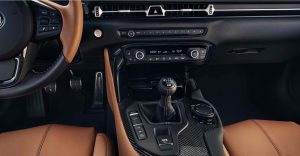
Perhaps because both companies realize that while automatics may shift faster and more perfectly than most human drivers can, many human drivers still prefer to shift for themselves, in cars such as these.
What It Is
The Supra is the Toyota version of the BMW Z4.
Both cars are built on the same assembly line and share identical BMW-built four and six cylinder engines. But they diverge in a number of ways, including that the Z4 is a convertible-only while the Supra is a hardtop, only. For that reason, the Toyota version of this high-performance sports car is about a hundred pounds lighter and so a little quicker than the BMW-badged (and skinned) version.
It is also considerably less expensive than the BMW-badged (and skinned) version, which starts at $49,900 for the four cylinder-powered version. With the optional six, it stickers for $63,700.
The base price of the same basic thing – with a roof made of steel rather than cloth – and a Toyota badge – stickers for $43,540 to start with the four and only $51,890 with the optional six.
This may explain why the Toyota-badged (and priced) version of this sports car has outsold the BMW-badged version by more than two-to one.
And why – it appears – the BMW-badged version is on deck to be cancelled after the 2024 model year.
The huge news for 2023 is that a manual transmission is available – with the optional/more powerful six-cylinder engine. The standard four-cylinder engine will continue to be paired with the eight speed automatic that was previously the only transmission available, with either engine.
There is also a new, limited-production run A91-MT Edition (with the manual) that comes with a unique-to-this-model Cognac leather interior and two special exterior paint schemes, along with lightweight carbon fiber bits and pieces. A JBL 12 speaker premium audio system is also part of the deal.
All 2023 Supras get revised suspension tuning and a new Hairpin+ function that enhances high-speed stability in . . . hairpin turns. Also included – with the purchase of any new Supra – is a free high-performance driving instruction at a race track, along with a one-year membership in the National Auto Sport Association.
What’s Good
Being able to shift for yourself.
BMW drivetrains – for Toyota dollars.
A hardtop – for those who don’t want a soft-top.
What’s Not So Good
The most accessibly priced Supra – with the four – is still automatic-only.
BMW engines are apt to cost more to service than Toyota engines.
If BMW cancels the Z4, it likely means the end of the Supra, too.
Under The Hood
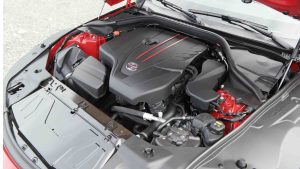
Both the Z4 and the Supra are powered by the same standard – and optional engines, identical in specifications and output.
The standard engine is BMW’s 2.0 liter four cylinder engine, turbocharged to produce the same 255 horsepower and 294 ft.-lbs. of torque at 1,500 RPM. It is paired with the same BMW-built eight speed automatic, which routes the power to the rear wheels.
What’s different is that the BMW weighs 3,287 lbs. while the Supra with the same drivetrain weighs 3,181 lbs. The latter is lighter because it is a hardtop and so doesn’t need the additional bracing that BMW installed in the Z4, to shore up the structure lost by cutting off the hardtop. And because it is a little lighter, it is a little quicker, getting to 60 in 4.7 seconds vs. 5.1 seconds.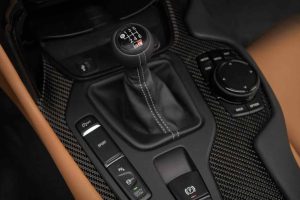
The optional engine – a 3.0 liter inline six, also turbocharged – is also identical in specifications and output. It makes 382 horsepower and 368 ft.-lbs. of torque at 1,800 RPM.
But there is more than one difference.
The first one is the same difference.
Being lighter, the Supra with the six is quicker than the BMW with the same six. The latter gets to 60 in 3.8 seconds vs. 3.7 for the former. But there is one more difference. In addition to being available with a six speed manual, the Toyota version of this sports car features a Toyota-modified version of the six speed manual transmission that win’r be shared with the Z4. The mods to the transmission include different gears – as well as the excision of weight-adding peripherals such as the acoustic padding used in the BMW to muffle the sounds of the gears spinning (egads).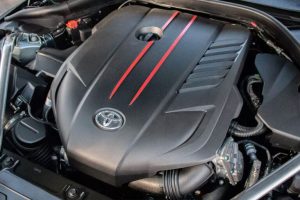
The manual-equipped Supra also features a larger clutch and a heavier return spring, designed to increase clamping force. Both the Supra and BMW versions have the same rev-matching downshift function that simulates a manual double-clutch action. But you can turn this electronic feature off and perform the manual double-clutch yourself, manually.
Not surprisingly, the manually-shifted versions of these twins aren’t quite as quick – and definitely not as consistently quick – as the automatic-equipped versions. That being the usually touted reason for eliminating the manual in favor of the faster-shifting (and more perfectly shifting) automatic, as in the case of the now automatic-only Corvette for instance.
But that sacrifices both the art and the fun of shifting for yourself – and perfect shifts only matter when you’r racing for money, as opposed to driving – for the fun of it.
On The Road
A great rib eye is just slightly less great without the au jus. A great sports car is better with a clutch.
It is tragic that so many sports car manufacturers have forgotten this truth in pursuit of stats. And also for the sake of compliance. It is easier, you see, to program an automatic to shift just right to achieve the highest-possible score on government miles-per-gallon tests. Even though – out in the real world – it is almost impossible to duplicate those test results, because driving according to that programming is excruciating. Upshifting too early, with the result being the engine lugging – unless you use your right foot to force a downshift (and there goes your “EPA estimated” city/highway numbers).
It is also easier to assemble an automatic-equipped car’s driveline as it moves down the assembly line. The automatic’s gear selector is plugged in, without any cables to adjust. A manual has lots of adjustments, being a mechanical thing.
And that’s why you feel this thing. The resistance of the clutch pedal, as you depress it. Feeling out the engagement point, just right. At the same time, your right hand feels the transmission, which sends its good vibrations through the shifter, which connects your hand to the transmission. As opposed to the disconnect of a drive-by-wire automatic transmission that goes from Park to Drive because a sensor told it you just selected that.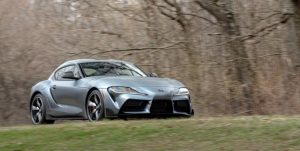
It is the difference between holding your girl’s hand and trying to remember what it was like, back when you could.
It’s just a shame that Toyota won’t offer the manual with the standard 2.0 liter four, which arguably would benefit more since it hasn’t got the 382 horsepower that comes with the six.
Traditionally speaking, sports cars have had high-revving fours backed by manuals, the idea being to give the driver the same kind of experience that an expert horseman has when he spurs the beast and says, giddyap!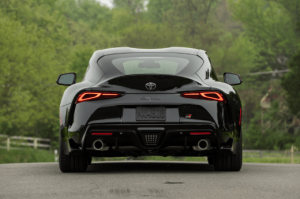
Not that the four is gasping for breath. It is still much stronger than the fours in other sports cars, such as the Mazda Miata and the Soobie/Toyota-shared BRZ/86 twins, which need to be worked in order to get their best. But the abundant horsepower produced by the Supra’s four would be more fun to use if you could really control it – in the way you can when you’re in full control of the delivery of that power.
This is not to disparage the eight speed automatic that’s standard with the four and still available with the six. It cannot be faulted on any objective grounds. It shifts both precisely and aggressively as well as intuitively. It knows you’re in mid-corner, for instance – and still on the the throttle – and doesn’t upshift until you’re coming out of the corner, throttled up. It also knows when to settle down. And it never misses a shift – as you inevitably will, when you’re the one changing gears and working the clutch.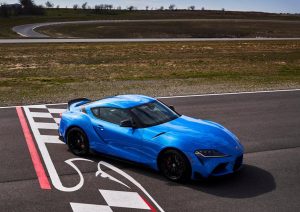
But it’s the au jus that makes this rib-eye perfect.
Manual or automatic, the Supra, itself, fits like a racing glove. You meld with it as much as drive it. And – speaking of that – Toyota lets you drive it. Whether you drive the manual or the automatic version. There is a single button on the console that deactivates all of the “safety” systems, which have nothing to do with wether the car is safe to drive but rather, pester you with driving interferences designed for people who have no business driving.
Anyhow, it makes it much more pleasant – as well as exciting – to drive the Supra.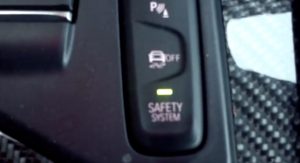
Even more so if it has the six.
It is an inline six, light and free-revving – as has been Supra tradition. Even if it is a BMW six. Being a six, it is smooth – almost like an electric motor. But no electric motor makes sounds like this, which is why electric motors will never replace engines like this, in the hearts of people who appreciate such sounds. As well as the ability to shift. Electric cars don’t even have transmissions, as a rule.
And just one speed – that being forward.
Well, until the battery runs out of juice.
People apparently like the looks of the Supra a lot more than they do the looks of the Z4 it’s built alongside of.
Well, maybe they just like the price of the Supra – which is thousands less than the price of the Z4. More than ten thousand less, in the case of the Supra with the six vs. the Z4 with the same thing. It may explain why Toyota sells about twice as many Supras as BMW sells Z4s.
And it could be one other thing.
The Toyota is a hardtop while the Z4’s top got chopped – in favor of a foldable fabric top. This is part of the reason for the Z4’s higher price as well as its being heavier, the latter mattering to many who buy sports cars and prefer a more favorable power-to-weight ratio than they do being able to lower the top. 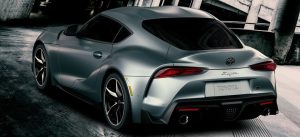
Plus, it just looks good.
Better, arguably.
The hardtop is part of the Supra’s good looks. To remove it would be a mutilation. It helps to define the overall shape – and the way that shape flows. And that is just the right word here. The bodywork flows over the chassis, erotically bulging outward and upward as it passes over the rear wheelhouses, tapering backward waspishly – and suggestively. The Z4 is not an unattractive car. But parked beside the Supra, it is like Ginger vs. Mary Ann.
Inside, you will find an interior that is more similar to the Z4’s – with one big (and happy) exception. The Toyota does not have the oddly trapezoidal tachometer/speedometer combo BMW has been using in its cars lately. Instead, a more aesthetically pleasing and (arguably) more functional big round tach as the centerpiece, with a digital-readout speedo adjacent.
This not only looks better, it reads better.
Another difference has to do with space. Both of these cars are two-seaters and that usually doesn’t leave room for much else. But because the Supra is a hardtop – and has a hatchback – it has more usable space for your stuff than the BMW, which has a trunk.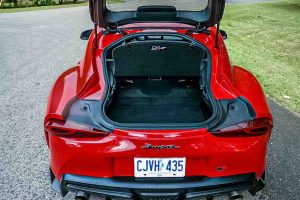
Don’t judge this by the stats, by the way – which appear indistinguishably different (9.9 cubic feet for the Z4 vs. 10.2 in the Supra). The difference is that the Supra’s cargo area extends forward into the passenger area while the Z4’s doesn’t. You can fit more, lengthwise – and otherwise – in the Toyota, which makes it surprisingly practical for the kind of car it is.
The Rest
It’s a good thing the Supra has space in back because there is almost none up front – for your stuff. There’s not even a small center console storage cubby. Just a pair of cupholders. That plus a small slit of space in each lower door panel, just enough for a pack of cigs or your phone. Head and legroom, on the other hand, are generous.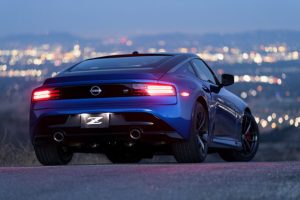
The Bottom Line
Toyota was smart to get a manual into production – now that Nissan’s Z-car is back in production. That one comes standard with a 400 horsepower V6 and a manual. It also comes standard with a lower starting price: $39,990.
But it’s not new so much as rebooted. And while it’s a nice package, it’s not as nicely a packaged. When it comes to sports cars, the stats aren’t everything. How they make you feel when you look at them is probably just as important as how they make you feel when you drive them.
And this one will make you feel really good, even if you’re just looking.
. . .
Got a question about cars, bikes or anything else? Click on the “ask Eric” link and send ’em in! Or email me directly at [email protected] if the @!** “ask Eric” button doesn’t work!
If you like what you’ve found here please consider supporting EPautos.
We depend on you to keep the wheels turning!
Our donate button is here.
If you prefer not to use PayPal, our mailing address is:
EPautos
721 Hummingbird Lane SE
Copper Hill, VA 24079
PS: Get an EPautos magnet or sticker or coaster in return for a $20 or more one-time donation or a $10 or more monthly recurring donation. (Please be sure to tell us you want a magnet or sticker or coaster – and also, provide an address, so we know where to mail the thing!)
My eBook about car buying (new and used) is also available for your favorite price – free! Click here. If that fails, email me at [email protected] and I will send you a copy directly!


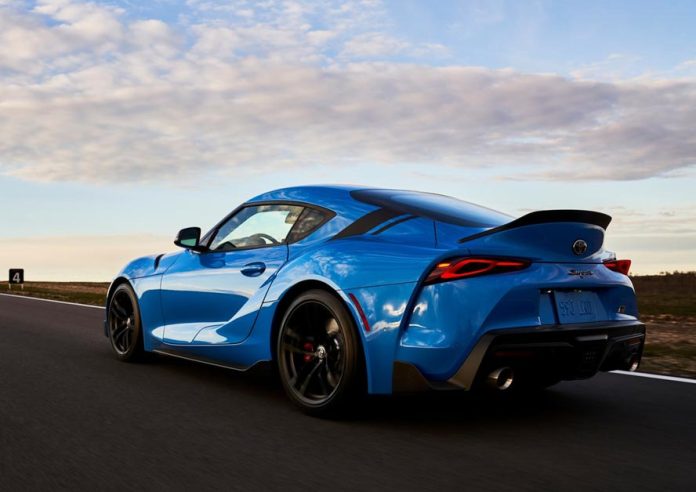

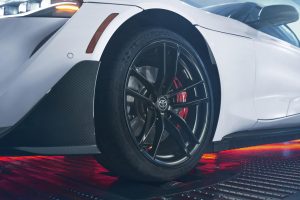
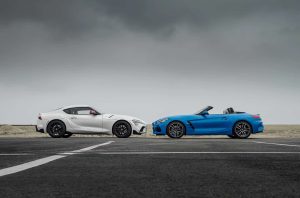








I really wanted to like the Supra. I tested when replacing my totalled beloved M2C a year ago. I couldn’t get over the lack of over-the-shoulder visibility and that the interior was straight BMW but chintzier. The availability of a manual would likely have trumped those issues.
Hi Mr. Bobo,
The manual does make all the difference. Without it, I’d rather have a Miata. But with it… hoo-boy!
Is it off-off, or only partially off (ie still on, but the threshold where it kicks in is noticeably reduced)?
I’ve owned a Mk. IV for 22 years and I love that car thoroughly. I wouldn’t sell it at ANY price and I’ve put more than 200k on it with no issues. I drove one of the Mk.Vs at a Cars and Coffee and loved it, except for the automatic, which like you said was perfectly competent and good. Now they’ve fixed one of the two complaints about the car (the other is that if you roll down the windows, the din is awful), I’d seriously consider one. Even the 4-cylinder would be nice.
When car companies are run by engineers and not business grads. God bress Toyota. that safety system off switch is awesome!
Hi Mark,
“God bress Toyota.”
Just almost pissed myself… thank you, sir!
I gotta admit, the Supra’s body design has aged Very Well. Looks great. However, if an automatic 6 cylinder Supra is at least as fast or faster, the new manual tranny don’t impress me much.
Can’t wait to see some comparison tests vs the new Z-Car. Don’t care if the Z is partly rebooted, or not packaged as well. At least Nissan didn’t sell out its bloodline…..its very soul….by slapping Z-Car badges on some eurocar company’s chassis and engine. They still have the chops to” roll their own.” That earns a lot of credibility and respect.
More cars like these.
This is what we want, not golf carts.
‘Word is that it [BMW’s Z4] too will be available with a manual come 2023.’ — eric
Let it be so, Lord!
Historically, convertibles have been the most prized (because rare) classic cars.
But a convertible sports car with an automatic transmission is just wrong. Think Mazda Miata with an automatic: whoever configured that oxymoronic mess should be severely punished.
But a Z4 convertible with a six-speed manual — if one wanted to buy and cling … err, hold — till the sun goes dark, would require a hard look.
As Eric points out, the hardest pill to swallow in the Z4 is its butt-ugly trapezoidal gauge cluster. Some teutonic aesthetician thought it clever to make the gauge cluster mirror the lozenge shape of the grille. But pointy-edged gauge labeling is as off-putting as misshapen breasts on one’s surrogate mechanical mistress.
*places hairy hands round the gauge cluster and makes rude motorboating sounds*
Fortunately, this decision doesn’t need to be made for a few months.
But it’s relieving to know, in the presumed twilight of vehicles like these, that a svelte, straight-six, manual-shift beast is available for this brief, unlikely window.
Having been seduced as a lad barely out of high school by a straight-six, four-on-the-floor Jaguar E-type, I’ve craved one — or an updated facsimile without the Lucas electrics — ever since.
Now it’s here. Maybe even two of them. Ménage à trois, anyone?
Amen, Jim!
I really – really – like this car. In part because I love straight six engines. But I also love hardtops; I’m just not a convertible guy. Now add a manual… and it’s very tempting.
I’m a convertible guy, and normally would consider a Mustang GT next, but something about this speaks to me.
Maybe in a few years, I can own both.
Hi Zane,
It speaks to me also. This car is brilliant. I still have it, too . . . well, until tomorrow…
Can’t wait to see whatcha think of the Z.